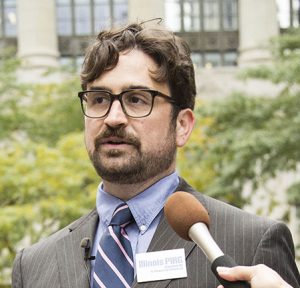Report: State energy laws created ‘profit machine’ for ComEd
By Sarah Mansur Capitol News Illinois — December 2, 2020SPRINGFIELD — State energy laws passed in 2011 and 2013 allowed Commonwealth Edison to earn huge profits while the utility giant failed to fulfill its promise of consumer savings and benefits, according to a new report issued by an independent public interest group this week.
The report from the Illinois Public Interest Research Group describes the energy laws as a “profit machine” for ComEd, the largest utility company in the state. The laws established a formula rate “that guaranteed revenue and profits,” weakening the regulatory role of the Illinois Commerce Commission.
The Illinois General Assembly passed the Energy Infrastructure Modernization Act in 2011 over the veto of then-Gov. Pat Quinn. The law required ComEd to spend at least $2.6 billion on infrastructure improvements — up to $3 billion — over a period of five to 10 years and created a formula for raising consumer rates based on those expenditures.
The “performance-based formula rate” included a mechanism for the utility to increase its service rates and recover the costs of delivering its services “prudently incurred and reasonable in amount.” The Illinois Commerce Commission, which regulates utilities including ComEd, can prevent a utility from recovering costs that the commission finds are not prudent or reasonable.
Two years later, the General Assembly passed a related law that overruled the Illinois Commerce Commission’s adverse regulatory decisions against ComEd and made changes to the formula rate that further diminished the commission’s oversight.
ComEd is also the focus of an ongoing federal investigation that revealed the company engaged in a bribery scheme, from 2011 to 2019, seeking to influence House Speaker Michael Madigan to pass favorable legislation, including EIMA and the Future Energy Jobs Act, which passed in 2016.
Federal prosecutors in Chicago entered into a deferred prosecution agreement with ComEd this summer that allows the company to avoid being prosecuted for crimes in exchange for paying a $200 million fine and agreeing to cooperate in the federal probe.
Last month, four people — including former ComEd CEO Anne Pramaggiore and former ComEd executive turned lobbyist John Hooker — were indicted on charges of bribing Madigan by awarding no-work jobs, internships and contracts to Madigan associates in order to win his favor for legislation benefiting the company. Madigan has not been charged, and he denies any wrongdoing.
The PIRG report, released on Tuesday, Dec. 1, outlines how ComEd increased its base rate — or the value of its assets used to calculate the utility’s level of return —by about $5.1 billion, from $6.2 billion in 2011 to $11.4 billion in 2019.
ComEd’s profits have increased by 47 percent between 2011 and 2019, according to the report, as customers saw a 37 percent increase in the company’s delivery services over the same time period.
During the six years after the follow-up legislation to EIMA passed, ComEd’s profits increased by $1 billion, compared to its profits over each of the two previous six-year periods going back to 2001, according to the report.
Abe Scarr, director of the Illinois PIRG and coauthor of the report, said the information in the report should dispel the company’s claim that while politicians may have acted corruptly to secure the legislation, the legislation itself does not harm consumers.
“We think very clearly that there has been a harm that consumers are paying much more than they would have otherwise for their delivery service, and that we were promised all types of customer benefits from the law, and those have fallen short,” Scarr said. “In the wake of all this, not only should we allow the federal prosecutors in the legal system to work its way through the process, but legislators need to take action and right some of these wrongs from the past decade because customers could be overpaying for years to come.”
Although ComEd customers have seen their utility bills remain relatively flat in the past decade, Scarr said this is because costs on the supply side have decreased and distribution costs have increased.
“But we think that the distribution side shouldn’t have gone up as much and customers should have seen more savings in their bills than they have,” he said.
ComEd serves 4 million customers across northern Illinois, according to the company’s website. It’s service territory borders Iroquois County to the south, the Wisconsin border to the north, the Iowa border to the west and the Indiana border to the east.
The 111-page report explains how the 2011 and 2013 energy laws altered the existing process, which was in place for nearly a century, used by the Illinois Commerce Commission to set a utility’s electricity rates and determine the investment costs the company can recover.
“As part of the traditional rate case process, the Commission would set the return on equity, the profit margin applied to the rate base, after evaluating the risk profile of the company. Under EIMA’s formula rates, the Commission has no such authority,” the report states.
The formula rates established by EIMA “strips the Commission of the tools and mechanisms traditionally used to investigate and hold utilities accountable in an effort to promote the public interest,” according to the report.
Scarr said the two energy laws have allowed ComEd to recover almost all of its roughly $5 billion in investments. In fact, only $23 million of that amount was disallowed, or determined it should not be charged to customers, by the Illinois Commerce Commission since 2011.
“That’s why we call it a profit machine,” Scarr said. “Because they spend the money and put it through this formula, and out comes their guaranteed revenue and their guaranteed profits.”
In an emailed statement, a ComEd spokesperson denied that the energy laws harmed consumers or that they changed the way ComEd can recover its investment costs.
“The Deferred Prosecution Agreement does not contain any allegations that consumers were harmed by legislation passed in Illinois. In fact, the bipartisan legislation that was passed – EIMA and (Future Energy Jobs Act in 2016) – resulted in substantial benefits for ComEd’s customers, including reliability that has improved more than 70 percent since 2012 to record levels,” the statement from Shannon Breymaier, ComEd communications director, read in part. “The standards for which investments ComEd can recover today are the same as they were before EIMA created the formula rate.”
smansur@capitolnewsillinois.com









